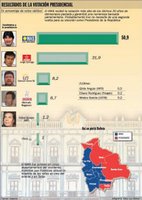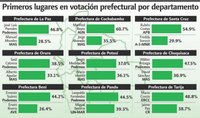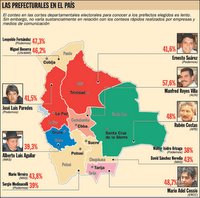Evo Morales, Presidente (Update 1)
Now, in the following picture, from Santa Cruz' daily El Deber we see the percentages obtained by all parties, but most interestingly, the East-West divide in the vote. In all blue regions, the winner was MAS and in all red regions, the winner was Podemos. Regional interests appear clear: The East, usually seen as a most progressive and richer region, has opted for Podemos over MAS. All the talk of nationalization and a strong state does not appear to fare well here. This, however, does not mean that MAS did not get a surprise second place in Santa Cruz, which signals that MAS' discourse better accepted in rural areas than previously thought. Further North, though, MAS did not repeat the success, as it was not even close to second in Pando and Beni.
In the West, MAS won its stronghold departments and managed to win departments that were thought to lean on Quiroga's favour, such as Potosi and Chuquisaca. Podemos, however, managed to get second places in all these regions, so that they get one senator for each Blue department.

All in all, the parliament is going to look as in the second picture, also from El Deber. The first interesting thing to notice is that Podemos, which is trailing by 20% in the general vote, has a majority in the Senate. This is due because Podemos either won or came second in all regions. MAS did not do as well in the North East, as previoulsy stated, so, no Senators for these regions. In the lower house, MAS do get half the congressmen and have a sizeable 20 MP difference with Podemos. Interestingly, even if we were to sum all centre-right parties, MAS is still the majority: Podemos (45) plus UN (10), MNR (8) and NFR (1) amount only 64 MPs. On the other side of the spectrum, MIP's only MP is probably going to be closer to MAS, giving the left a total of 66 MPs.

Now, to the third topic: prefects. According to a simulation done by Apoyo Opinion y Mercado, MAS has not won a single prefect, while Podemos has won 6 and different citizen groups the other 3 (the citizen group in Cochabamba is aligned with the now-extinct NFR and the one in Tarija with MNR), although MAS may still win in Potosi. This means that most of Morales' activities will be well chequed in the regions. Expect the prefects of Santa Cruz and Tarija to pose a great threat to MAS plans of hydrocarbon nationalization: the Santa Cruz prefect, from a citizen group called Autonomia Para Bolivia (Autonomy for Bolivia), will probably start pushing hard towards more departmental autonomy from the start. Mario Cossio should follow suit.

Update 1: It seems that Apoyo Opinion y Mercado has, once again, failed tremendously in its simulations. For a more accurate description of the prefect election, see the graph below, from El Deber. It seems that MAS is ahead in two regions -Potosi and Chuquisaca- and has won in a third one, Oruro. Also, the MAS candidate for the Tarija prefecture is disputing the result on grounds that, according to him, Mario Cossio has colluded with the CNE in order to 'depure' up to 70,000 voters, all of whom were his supporters (!).
The rest of the results are unchanged.

Bolivia














